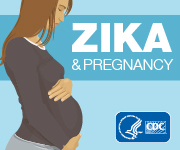We cannot ignore the current Zika virus outbreak. Alarming headlines detailing the spread of the Zika virus dominate the news. The World Health Organization has declared Zika virus to be a public health emergency of international concern. For the vast majority people in the world, the Zika virus does not pose a significant threat; however, what has generated considerable anxiety is the suspected link between Zika virus infection and microcephaly.
Zika virus is not the only infection that may cause birth defects. We know that other infections, including other rubella, cytomegalovirus, toxoplasmosis, may affect pregnancy outcomes, and we know what steps to take to reduce these risks. One of the things that makes the Zika virus so frightening is that we have relatively little information on how Zika virus may affect pregnancy and what to do about it. In that void, anxiety finds fertile soil and can flourish.
What We Know
Zika virus is a mosquito-borne virus related to dengue virus which is transmitted primarily by Aedes aegypti mosquitoes.
The current outbreak of Zika virus was first reported in Brazil in May 2015. Active mosquito-borne transmission of Zika virus has been reported in 26 countries or territories in the Americas.
Infection is usually asymptomatic. When symptoms are present, this typically results in a mild and self-limited illness with symptoms of fever, rash, arthralgia, and conjunctivitis.
What is so alarming, however, is that there has been a surge in the number of children born with microcephaly in Brazil in conjunction with the Zika outbreak. In response, the Brazilian Ministry of Health has established a task force to further investigate possible connections between the virus and microcephaly in infants.
At this point we have no vaccine for Zika virus, nor is there a specific treatment for the infection. The best protection we have against the Zika virus is the prevention of mosquito bites in affected area.
CDC Recommendations for Reproductive-Aged Women
If you are living outside of Mexico, Central America, or South America, it is pretty difficult to get Zika virus. Surveillance programs in the United States have not detected Zika-infected mosquitoes. Cases of Zika infection have been detected in persons who have recently traveled to countries where Zika is present. In addition, Zika can be spread by a man to his sexual partners, so the CDC recommends:
Men who reside in or have traveled to an area of active Zika virus transmission who have a pregnant partner should abstain from sexual activity or consistently and correctly use condoms during sex (i.e., vaginal intercourse, anal intercourse, or fellatio) for the duration of the pregnancy. Pregnant women should discuss their male partner’s potential exposures to mosquitoes and history of Zika-like illness (http://www.cdc.gov/zika/symptoms) with their health care provider; providers can consult CDC’s guidelines for evaluation and testing of pregnant women.
Men who reside in or have traveled to an area of active Zika virus transmission who are concerned about sexual transmission of Zika virus might consider abstaining from sexual activity or using condoms consistently and correctly during sex. Couples considering this personal decision should take several factors into account. Most infections are asymptomatic, and when illness does occur, it is usually mild with symptoms lasting from several days to a week; severe disease requiring hospitalization is uncommon. The risk for acquiring vector-borne Zika virus in areas of active transmission depends on the duration and extent of exposure to infected mosquitoes and the steps taken to prevent mosquito bites (http://www.cdc.gov/zika/prevention). After infection, Zika virus might persist in semen when it is no longer detectable in blood.

CDC has issued a travel alert (Level 2-Practice Enhanced Precautions) for people traveling to regions and certain countries where Zika virus transmission is ongoing: Brazil, Colombia, El Salvador, French Guiana, Guatemala, Haití, Honduras, Martinique, Mexico, Panama, Paraguay, Puerto Rico, Suriname, and Venezuela.
Until more is known, and out of an abundance of caution, CDC recommends special precautions for pregnant women and women trying to become pregnant:
- Pregnant women in any trimester should consider postponing travel to the areas where Zika virus transmission is ongoing. Pregnant women who do travel to one of these areas should talk to their doctor or other healthcare provider first and strictly follow steps to avoid mosquito bites during the trip.
- Women trying to become pregnant who are thinking about becoming pregnant should consult with their healthcare provider before traveling to these areas and strictly follow steps to prevent mosquito bites during the trip.
For more information, visit the CDC Zika and Pregnancy webpage.
Effects of Zika on Future Pregnancies
According to the CDC, there is no evidence to indicate that Zika virus, after it is cleared from the blood, poses a risk of birth defects in future pregnancies. Because Zika virus usually remains in the blood of an infected person for about a week and in the semen for longer than a week, the CDC recommends that persons who have recently traveled to areas of active Zika outbreaks should talk to their health care providers before attempting to conceive. (Given that the ZIKa virus persists in blood and semen, it seems that waiting to conceive is the best option; however, the CDC does not specify how long one should wait after potential exposure to the Zika virus.)
Ruta Nonacs, MD PhD
Resources
CDC: Areas with Zika Infection
CDC: How to Avoid Mosquito Bites
CDC: Information for Healthcare Providers
CDC: Question and Answers: Zika Virus Infection (Zika) and Pregnancy
Seleni: Anxiety About Zika During Pregnancy
Seleni: Addressing Anxiety About Zika Virus in Obstetric Practice








Leave A Comment